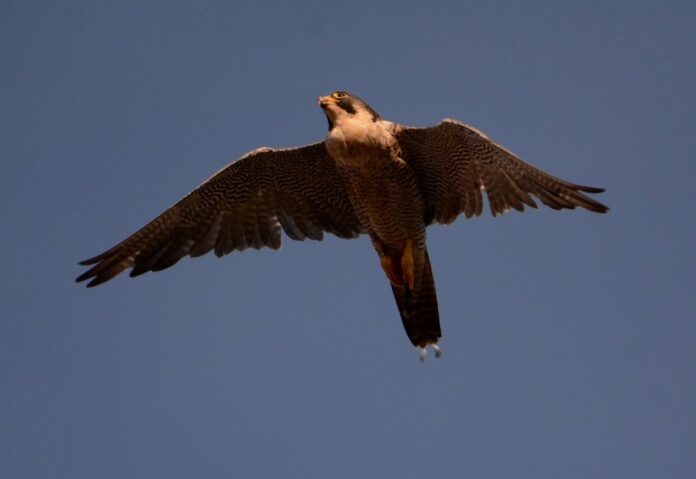LONDON: One of London’s most recognizable buildings, Battersea Power Station, is a favorite spot for peregrine falcons, which have bred 22 chicks there in the past 10 years.
“The peregrine falcon is a highly territorial and adaptable species, as demonstrated at Battersea Power Station, a major construction site since 2013,” David Morrison, a peregrine falcon urban consultant, told Arab News. “The birds have adapted to the changing landscape, and adjusted to all aspects of the works.”
Morrison, who also looks after other birds, including black redstarts was hired by BPS in 2000 to monitor the falcons, the fastest bird in the world, when they were first spotted nesting at the site. The developer working there at the time had to halt construction work until their chicks had hatched and left the nest, as their habitats are protected by UK law.
“Peregrine falcons and black redstarts are Schedule 1 species and, as such, it is a criminal offense to disturb them while they are breeding,” said Morrison, who is a Schedule 1 license holder and regularly works with governing bodies to assist in breeding and management efforts.
“Adults and young at or near their nests fall under the highest protection given by UK Wildlife laws.”
Peregrine falcons are the dominant species of falcon in London as they are large, extremely fast and very aggressive, he added, and their numbers are at an all-time high. A national survey conducted in 2014 identified 1,505 breeding pairs in the UK, and the current figure is estimated to exceed 2,000 pairs.
At least 45 of those breeding pairs are in the English capital. Morrison monitors and assists 16 of them at various locations, including the Houses of Parliament, which is also undergoing construction and refurbishment work, and the Tate Modern art gallery.
“They prefer elaborate buildings with ledges and niches, especially for fledgling juveniles, with sufficient height to provide a buffer from any disturbance below,” he said.
Between 2013 and July this year, the falcons at BPS — which officially opened on Oct. 14 as a public attraction celebrating the building’s illustrious past as a power station — were housed in a temporary, purpose-built tower with a nesting box, where they thrived and fledged 20 juveniles.
“The Tower and the nest box offered breeding stability, a proper egg ‘scrape’ where eggs could not roll and, above all, protection from the elements, removing the risk of being washed out or flooded,” Morrison said.
“Their new permanent nest, integrated into the northeast wash tower of the power station, also offers complete protection (and) the pair have already shown that they favor it considerably.”
A “recovery plan” is also in place to help juvenile birds that get stuck on the ground during the crucial fledging phase.
Sarah Banham, head of communities and sustainability at the Battersea Power Station Development Company, said when developers began construction work in 2014 on the decommissioned Grade II listed coal-fired power station, which had been empty since the 1980s, they understood that to refurbish the site and get it ready for occupation, they had to move the peregrines safely.
“We built this new riverside penthouse for the peregrine falcons … It’s got a riverside terrace with a balcony so they can look out across the river, they have two front doors, and they’ve got the brickwork inside. I mean, it’s incredible,” she said.
Their new permanent habitat is easy to clean, to avoid contamination, she said, and there are plans to track the chicks that are born there next year after they leave the nest to see where they go.
The nesting site provides ideal hunting grounds for the birds as they can swoop down over the River Thames, or hunt from perches on chimneys or construction cranes in search of the other birds that are their prey, which can include sparrows, hawks and kestrels, though they live mainly on pigeons.
Banham said the falcons bond in pairs and there are only ever two adults in a nest at a time. When one dies, another bird will move in.
“Since I’ve been on the project, which is 16 years, we’ve had two females here and then I think the last male left about three years ago, so we’ve got a new, younger male who’s very good at hunting and they are now bonded,” she said.
The young father has a particular fondness for hunting the wild green parakeets that live in nearby Battersea Park, she added.

